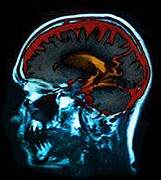- 7 Best Breads for Maintaining Stable Blood Sugar
- Gelatin vs. Collagen: Which is Best for Skin, Nails, and Joints?
- The Long-Term Effects of Daily Turmeric Supplements on Liver Health
- Could Your Grocery Store Meat Be Causing Recurring UTIs?
- Are You Making This Expensive Thermostat Error This Winter?
- Recognizing the Signs of Hypothyroidism
- 10 Strategies to Overcome Insomnia
- Could Artificial Sweeteners Be Aging the Brain Faster?
- Techniques for Soothing Your Nervous System
- Does the Water in Your House Smell Funny? Here’s Why
Childhood Brain Tumor Survivors May Have Memory Troubles


Adult survivors of childhood brain tumors appear to have worse working memory than other adults, a small study finds.
Researchers tested 17 adult survivors of pediatric brain tumors in the posterior fossa part of the brain. Then they tested a control group of 17 healthy adults. The brain tumor survivors scored significantly lower on tests of working memory, the study found.
Working memory is the ability to retain and use information for short periods of time. The researchers said working memory is an important component of higher-level thinking.
Brain scans showed that different areas of the brain appeared to “activate” more in brain tumor survivors during a verbal working memory task compared to healthy adults. Increased activation in those areas was linked to worse performance on more demanding working memory tasks, the researchers said.
“Our goal was to identify the neural mechanisms underlying working memory difficulty in adult survivors of childhood brain tumors,” Tricia King, an associate professor of psychology and neuroscience at Georgia State University, said in a university news release.
King said their findings showed that the brains of the adult survivors needed to use additional areas of the brain, such as the prefrontal lobe, when there were greater demands for working memory.
“This increased prefrontal activation is associated with lower working memory performance,” she said.
The findings could help improve understanding of working memory problems in childhood brain tumor survivors and lead to improved treatment, according to the researchers.
The study was published recently in the Journal of the International Neuropsychological Society.
Working memory problems are common in other brain disorders, such as schizophrenia, multiple sclerosis and traumatic brain injury, the researchers said.
More information
The American Brain Tumor Association has more about childhood brain tumors.
Source: HealthDay
Copyright © 2026 HealthDay. All rights reserved.










